For many New Yorkers — whether they travel by Jitney or private helicopter — summer in the city would be a foreign concept without weekends in the Hamptons. But like Manhattan, the East End cannot be looked at as one giant real estate market.
“Our submarkets are so specific, and so individual. There are markets like Westhampton Beach and the North Fork, which are busier than they can possibly be, and yet there are areas like Sagaponack that are sleeping a bit,” said Judi Desiderio, the CEO of East End brokerage Town & Country.
This month, The Real Deal looked at several key Hamptons towns to see what’s driving sales, which towns have seen big-ticket trades or price chops and where this season’s new hot restaurants and stores are opening.
Much like the residential market in New York City, the Hamptons is in the midst of a correction compounded by a volatile stock market that’s given some high-end buyers the jitters. As a result, entry-level homes in the $1 million to $3 million range are selling rapidly, while the top of the market is softening — with sellers like Related Companies CEO Jeff Blau and Goldman Sachs CEO Lloyd Blankfein chopping the asking prices on their homes.
Overall, more than $5 billion worth of Hamptons real estate traded hands last year, down from $5.5 billion in 2014, according to Hamptons brokerage Saunders & Associates.
Company CEO Andrew Saunders attributed the dip in sales volume to the frenetic activity of 2014 and early 2015, when pent-up demand from the financial crisis was finally released.
“From 2008 through 2014, it was a slow crawl back,” he said. “Fast-forward the clock to 2014, it’s amazing how strong the market became. So 2015 was off from 2014 but still strong.”
Indeed, the average sales price hit an all-time high at the end of 2015 — at least since appraisal firm Miller Samuel began tracking the market in 1998. The fourth quarter also saw the highest number of $5 million-plus sales in a decade.
In addition, there have been some massive sales recently that have defied any notion of an ultra-luxury slowdown.
In January, for example, hedge funder Scott Bommer, a serial Hampton flipper, sold his East Hampton estate for $110 million — the second-highest price in East End history.
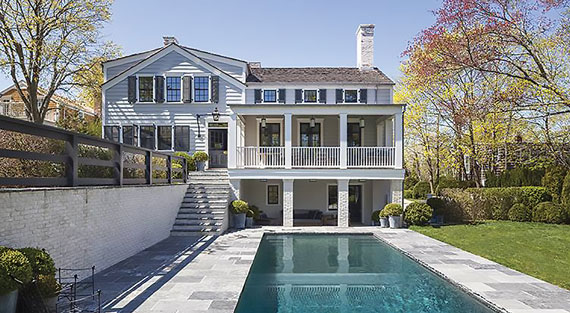
A $10.5 million listing at 42 Howard Street in Sag Harbor being marketed by Saunders & Associates
Nonetheless, the average price for the 10 most expensive homes sold in 2015 was $35.5 million — a 20 percent drop from 2014, according to Town & Country.
But despite any softening at the top, it’s hard to draw sweeping generalizations about the prime markets of the Hamptons, which stretches more than 40 miles from Westhampton to Montauk. Below is a market-by-market look at the playground for New York’s wealthy.
Westhampton
Being first — as in the first Hamptons stop on Route 27 — has its benefits. For many that’s the main draw of Westhampton, one of the most low-key East End towns.
Although local boutiques still line Main Street, glitzier shops are giving mom-and-pop establishments a run for their money as more buyers discover Westhampton’s untapped potential.
The area, which also includes the tiny village of Remsenburg, saw median prices hold steady while the number of sales dropped 17 percent during the first quarter year over year to 48, according to data from the Corcoran Group. Meanwhile, the average price was $1.2 million, down 15 percent year over year.
As a whole, however, buyers are still attracted to Westhampton because their money goes further than it does in many other East End towns — not to mention the fact that it’s closer to the city, brokers say.
Westhampton Beach, in particular, “is a sleeper,” said Desiderio, explaining that it’s a hidden gem with a lot of growth potential.
“The younger generation [of buyers] feel like in Westhampton Beach they can go back to the city in an hour. That’s a big draw,” she said, noting that many weekenders want to “lay on the beach on Saturday but have to be in the office at 9 a.m. on Sunday” to get reports and other business ready for the beginning of the work week.
Brown Harris Stevens’ Gayle Lopata said the area is a huge bargain, relatively speaking. “You can get more on the water this way than you can going out East. A house for $10 million could be $20 million or $25 million in Bridgehampton.”
Indeed, Remsenberg saw two record-breaking sales this year — one for $10.9 million and another for $7.6 million — still far lower than knockout prices being fetched in glitzier towns like Bridgehampton and East Hampton.
Gayle said the selling season started in February and March, far earlier than prior years. She chalked that up to the area’s value proposition and to former renters looking to buy.
Some clients from Manhattan and Brooklyn who can’t afford to buy larger homes in the city are opting to buy in Westhampton and spend more time there, she said.
For that reason, Gayle said the rental market is particularly chilly this year.
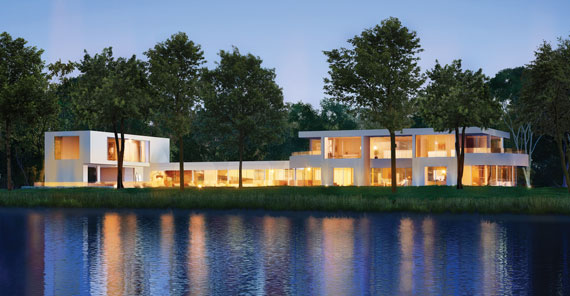
A $16.3 million listing in North Haven being co-marketed by Bespoke and Saunders
But home development is picking up, and anything below $2 million sells fast, she said, citing a relatively small new construction house that recently sold for $1.7 million, $150,000 over the asking price.
And new amenities are on their way.
On Dune Road, which runs along the ocean, Discovery Land CEO Michael Meldman paid around $19 million for the site of the Dune Deck Beach Resort. He’s planning a development called the Hills at Southampton, a luxury golf community, for the site.
And, plans to bring Smorgasburg — the popular Brooklyn food expo — to Westhampton Beach this summer are currently being floated.
Southampton
Once-pedigreed Southampton is seeing its share of newcomers and new money. Financier George Soros has a home in the area, and Southampton’s old-money types are increasingly rubbing shoulders with Hollywood stars and bold-faced names who’ve gravitated to the trendy nightspots, beachfront estates and exclusive golf courses, where membership can cost as much as $600,000.
Currently, the family of the late investor Frank Wyman is selling a 6,500-square-foot manse on nearly 5.5 acres for $59.9 million; the offering includes four separate lots. Meanwhile, the 15,500-square-foot spec house at 9 Olde Towne Lane, built on four acres by Kean Development, is asking $45 million.
Still, overall, Southampton Village saw 31 sales during the first quarter — a 9 percent year-over-year drop, according to Corcoran. That was even as prices shot up: The average sales price rose 19 percent, to $5.6 million, and the median spiked 25 percent, to $2.7 million.
“There are big beachfront trades in Southampton that always skew the numbers,” said Saunders.
But Town & Country’s Desiderio attributed the price jump, at least partially, to a widening gap between buyers and sellers, which resulted in fewer (albeit larger) transactions so far this year.
“Who’s buying at $10 million and up? Are they comfortable spending money right now? Maybe not,” she said. “And the people who own in that price range, they don’t have to sell, so they won’t drop the price to $20 million from $30 million.”
Cody Vichinsky, co-founder of Bespoke Real Estate, said plenty of buyers have been trying to make purchases in the high-end market, but the inventory is not there.
“The estate section is an area where you’re generally going to see a lot more demand … but there’s not a lot of great, new supply,” he said.
Still, new restaurants continue to pop up in the town.
Restaurateur Zach Erdem is opening Kozu, a Japanese, Peruvian and sushi restaurant, as well as Beach House, a nightclub with nine high-end suites that will run $1,000 a night on weekends or $800 during the week. Meanwhile, the Southampton Publick House is relocating to new digs on Jobs Lane and the Southampton Inn will open a new restaurant called Clyde’s.
Bridgehampton
Call it a bridge backup: Despite a recent uptick in home building, Bridgehampton is wrestling with tight inventory.
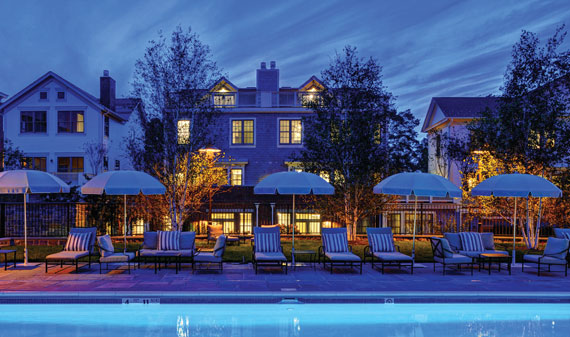
A $3.5 million townhouse at the Watchcase Factory in Sag Harbor being marketed by the Corcoran Group
There’s very little land left to develop in Bridgehampton — known as the heart of Hamptons horse country — partially because the town has purchased development rights in order to preserve open space. And that is impacting the famed price differential between the Hamptons’ north-of-the-highway properties on the bay side and those south of the highway on the ocean side.
“[A lack of land has] helped support prices north of the highway of $8 million to $10 million — a couple of years ago, those were south-of-the-highway prices,” said Corcoran’s Jason Schommer.
Meanwhile, developers are constructing new homes inland.
Developer Jeffrey Collé, for example, is building a 14,000-square-foot modernist spec home on 10 acres that’s asking $45 million. “What’s unique is that you’re seeing $20 million sales not on the ocean,” said Schommer.
He said that buyers looking for new construction in Bridgehampton on at least an acre are looking at “new bottom-line pricing” of $4 million and up. “If you don’t have that budget, it’s really hard to find,” he said.
Yet overall, sales volume and prices are slipping.
The number of sales in Bridgehampton and Sagaponack (its tiny waterfront neighbor to the south) during the first quarter fell 18 percent year over year to 33, according to Corcoran. At the same time, prices were down: The median sale price was $2.6 million (down 14 percent) and the average was $4.7 million (also down 14 percent).
“The market in Sagaponack and Bridgehampton is taking a ‘sleep,’ but there’s no bleeding,” said Desiderio, who noted that the major adjustment has been in new construction, where building has slowed. Desiderio explained that developers “missed the market” after aggressively “shopping for land” in the last few years.
Bridgehampton saw several notable price drops this spring. The most high profile came from Related’s Blau, who shaved $5 million off the asking price of his 313 Dune Road spread, which sits on 1.5 acres and is now asking about $27 million.
Meanwhile, Goldman’s Blankfein slashed the asking price of his home at 121 Parsonage Lane in Sagaponack to $13 million from $17 million. (Blankfein and his wife purchased a larger compound in Bridgehampton for $32.5 million in 2012.)
“I think we have seen a pause, just like we’ve seen it in the city with the super-luxury end of the market,” said Schommer. “The higher you go, the more inventory you see sit for a longer period of time.”
Bridgehampton’s active Downtown, anchored by Bobby Van’s Grill & Steakhouse, is nonetheless seeing its fair share of action: Celebrity chef Jean-Georges is taking over the restaurant at the historic Topping Rose House, where fellow culinary celebrity Tom Colicchio first opened an eatery in 2012. And in Sagaponack, Pierre’s of Bridgehampton will open a specialty takeout spot in the space formerly occupied by the Sagg General Store.
Sag Harbor
Known for their whaling roots and artsy branches — John Steinbeck lived out his last years there — Sag Harbor and North Haven defied the rest of the East End market and saw an 8 percent jump in sales.
But while the waterfront community hit 64 residential sales during the first quarter of the year, the overall dollar value of those transactions was down year over year, as the median price slipped 22 percent to $997,000 and the average price dropped 24 percent to $1.6 million. The priciest listing in the area is a 10,000-square-foot Greek Revival dubbed the Grand Captain’s House, which is asking $21 million.
Home building in Sag Harbor has picked up since May when two construction moratoriums — enacted last summer to curb overbuilding — were finally lifted. (While the moratoriums prevented many individual homeowners from building and renovating, larger-scale developments like Cape Advisers’ 64-unit condo development, the Watchcase Factory, hit the market in 2014 before the rules went into effect.)
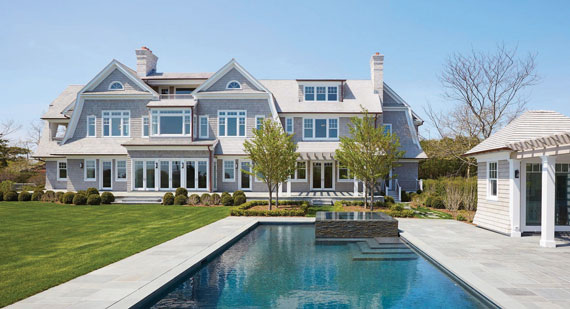
A $27.9 million listing at 500 Old Town Road in Southampton being marketed by Bespoke and Sotheby’s
“I wouldn’t say the floodgates are open, but there’s a level of certainty that now you can buy in Sag Harbor and know what you’re getting,” said Corcoran’s Schommer.
Saunders agent Diane Saatchi said the Watchcase development — which includes nine townhouses, 47 condos and eight one-bedroom bungalows — was a tipping point for the village’s residential market. “The [units] are high-end, upscale and attracted attention and wealth,” she said.
And other developers are indeed following suit. In November, Greystone Property Development announced plans to bring 11 Robert A.M. Stern-designed condos to Sag Harbor at 1 Ferry Road.
Meanwhile, Sag Harbor’s popularity is slowly leading to turnover in the village’s retail scene. In December, billionaire Ron Perelman purchased the building that formerly housed the B. Smith restaurant (where rent reportedly had risen to $40,000 a month). He also plans to open an outpost of the Manhattan restaurant Le Bilboquet.
“There’s still a five-and-dime,” said Saatchi, “but if it’s going to go anything like East Hampton or Southhampton, we’ll see the mom and pops go.”
East Hampton
Mark another one down for East Hampton. Known for its bold-faced names and record-smashing deals, the town took the prize for priciest Hamptons sale in 2015 when 226 Further Lane sold in late October for $57.3 million.
But that deal was quickly bested in January when Bommer made headlines for unloading three properties on Lily Pond Lane for $110 million in an off-market deal — less than two years after paying about $94 million for them.
Meanwhile, in May, billionaire David Geffen bought a sprawling home at 199 Lily Pond Lane from the estate of the late fashion executive Josephine Chaus for $70 million.
Indeed, the exclusive enclave known as East Hampton Village saw its average price skyrocket 53 percent to $9.5 million during the first quarter compared to the same time in 2015, according to Town & Country.
But the firm tracked just nine sales in that geographic pocket during the first quarter, a 44 percent drop from a year earlier. Desiderio chalked that up to a softening market, but one in which owners aren’t willing to cut prices. “This is old money, so it’s ‘If I don’t get my price, I am going to wait,’” she said.
Saunders’ Saatchi, meanwhile, said there’s a bit of a disconnect in the East Hamptons market, with younger buyers turned off by the area’s blue blood, Baby-Boomer feel. “It’s like the buyers are Brooklyn and Downtown and the sellers are Carnegie Hill,” she said. “So we have the product but not the buyers.”
Still, the East Hampton and nearby Wainscott area on the whole had a relatively strong showing.
The number of sales jump 14 percent to 134 during the first quarter year over year, as prices held relatively steady, according to Corcoran. The median price was $880,000 (down 4 percent) while the average was $1.2 million (up 3 percent).
As for commercial activity, East Hampton — which is home to high-end retail such as Tiffany & Co., Tory Burch and Hermés — has seen high turnover among retailers as rents have edged higher.
Amagansett
The more laid-back sibling to East Hampton, Amagansett is nonetheless a magnet for celebrities in its own right. Paul McCartney can often be seen riding his bike through the town’s winding roads, while Alec Baldwin has been spotted at morning spin classes.
Yet there was a chill in the market’s air.
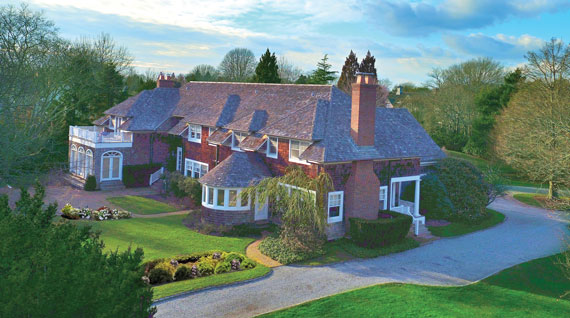
A $20 million listing in East Hampton being marketed by Town & Country Real Estate
There were only 24 sales during the first quarter, a 23 percent drop from the prior year. Still, despite the slide, prices were up: The median price jumped 19 percent to $2.1 million while the average price spiked 21 percent to $2.8 million, according to Corcoran.
Brown Harris Stevens’ Kieran Brew said that at the moment, Amagansett is characterized by low inventory and high prices. “There hasn’t been much available,” he said.
In recent years, Bridgehampton-based Farrell Building Co. had been actively building in the area, but that’s no longer the case. “He kind of maxxed out the available properties, and there were a lot of [builders] on his coattails driving up prices,” said Brew. “So now it’s mostly end users buying. There’s no money in it for a spec builder.”
Desiderio said Amagansett also has a lot of oceanfront land that’s owned by the state. “Amagansett has an audience all its own,” she said, calling the area an “un-Hamptons enclave” that attracts understated wealth. “If they want Amagansett, they’ll take nothing else,” she said.
Currently, the priciest listing is the 3,600-square-foot Fleetwood Estate, which sits on 33 acres at 85 Ocean View Lane and is asking $19.6 million.
On the restaurant front, the Hamptons was buzzing in May, when local landmark Cyril’s Fish House announced it was shuttering after the owners were found guilty of illegally expanding. Property owner Michael Dioguardi is reportedly looking for a new tenant.
Montauk
It’s impossible to discuss Montauk without giving a hat tip — or fedora tip — to the hipster scene that has defined it over the last five-plus years.
Often considered the Williamsburg of the Hamptons, Montauk’s raucous nightlife has irked some locals. There’s no denying that trendy new restaurants, bars and hotels — including the Surf Lodge Lounge, Ruschmeyer’s, Navy Beach and Sole East, among a slew of others — have transformed the town’s landscape in the last five years.
This summer, the local watering hole Sloppy Tuna is set to re-open under new management, while the owners of the Grey Lady restaurant — which has locations on the Lower East Side, in Aspen and on Nantucket — plan to open a Montauk outpost in the space formerly occupied by Harbor.
Against that backdrop, the Hamptons’ easternmost enclave, has, not surprisingly, seen rising prices.
The median sale price in Montauk rose 25 percent in the first quarter year over year, while the average price skyrocketed 156 percent to $3.8 million, skewed by big-ticket deals, according to Corcoran.
For example, Andy Warhol’s former estate, built in the 1930s as a fishing camp, sold for $50 million in 2015. J. Crew CEO Millard Drexler, who paid $27.5 million in 2007, was the seller; the buyer was gallery owner Adam Lindemann.
Currently, a 35-acre property at 42 Old Montauk Highway is the priciest listing in Montauk, asking $55 million.
Still, the number of sales during the first quarter dropped 19 percent to 26, while competition pushed prices higher. Corcoran’s Peter Moore attributed the drop in sales (along with rising prices) to “thin” inventory.
Under $1.5 million is the busiest segment of the market. “As houses come on the market, they get sold right away, so people are kind of circling, waiting for things to come on,” he said.
But last year, the market had a “feverish pitch,” said his wife and business partner, Lois Moore, noting that this year is more balanced.
In addition to single-family homes, buyers are circling the Montauk Shores Condominiums, a high-end, oceanfront trailer park with units going for north of $1 million. (The condos are technically considered mobile homes, though they look like small cottages.)
There’s also a booming commercial investment market.
In 2013, the longtime owners of the iconic Gurney’s Inn sold the 109-unit hotel — about half of which are timeshares — for about $25 million to George Filopoulos and LDV Hospitality, who renovated it and renamed it Gurney’s Montauk Resort & Seawater Spa.
Then late last year, Filopoulos and Lloyd Goldman’s BLDG Management paid $70 million for the hotel next door — the Panoramic View resort. The developers have since renamed the property (with 50 hotel rooms, 12 townhouses and three beach cottages) the Residences at Gurney’s and tapped Nest Seekers International’s Ryan Serhant to market the homes, which are going for $4 million to $12 million.
Such hoteliers and restaurateurs, said Peter Moore, “have bought sleepy, old hotels and restaurants and really paid a premium for the potential of growing them into more significant business.”
Currently, the East Deck Motel and Resort in trendy Ditch Plains — which last traded for $14 million in 2013 — is on the market, asking $25 million. And last month, the Gosman family, who own the iconic Montauk seafood restaurant bearing their name, listed their 14-acre site on the harbor for $52.5 million.
“Montauk used to be called a fishing village with a drinking problem, or a drinking village with a fishing problem,” said Lois Moore. “Urbanites now like the idea of being somewhere with open space, good restaurants and good hotels.”
